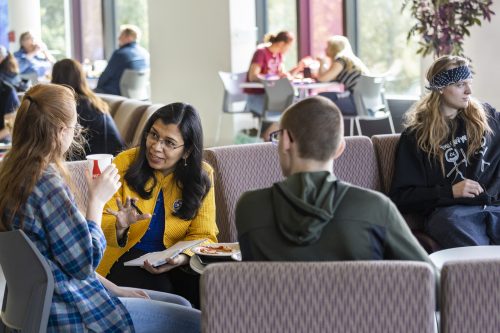Friday Focus: Becoming student-ready
December 6, 2019

— by Anupma Prakash, provost and executive vice chancellor
This November I attended the annual conference hosted by our accrediting body, the Northwest Commission on Colleges and Universities. The value proposition of the conference was “student success,”’ which is also the focus of NWCCU’s new standards of accreditation (PDF). I was asked a simple question: Is your university student-ready?
The three-day conference had a fantastic lineup of speakers, panelists and experts who reflected on the layers of issues we need to peel through in order to honestly answer the question. I took over 20 pages of notes and am excited to share with you some of the inspirational quotes and key messages that stuck with me.
The keynote address by Google’s chief education evangelist, Jaime Casap, focused on understanding the modern student, especially those born after 2000. This is a generation that has grown up with digital devices and the internet. They have seen the impact of recessions on their families. They know that the future job market is volatile and that most jobs will not come with long-term benefits. These students are realists and seek meaning and purpose in a job, rather than stability. Seventy-two percent want to work for themselves, and 9% make a full-time living online. They think about problems such as climate change, racial inequity and gun violence, and they want to solve the problems they have inherited.
This problem-solving generation is looking for something different from their college education. They seek experiential learning, research experiences, sense of ownership and engagement in extracurricular activities. Universities need to actively help students develop skills such as critical thinking, problem-solving, collaboration, creativity and ability to learn. And we need to stop referring to these as soft skills. These are critical skills — or power skills — that are essential for student success. Casap’s views on the modern student, education, digitalization and the future of work are captured in a series of YouTube videos.
Timothy Renick, senior vice president for student success at Georgia State University, talked about the need to close the equity and achievement gap in student success. He presented a case study on how his university used data and predictive analytics to figure out the different hurdles students were encountering that contributed to achievement gaps. Among other things, the data showed that students were frequently switching majors, taking courses that did not count toward their degrees, and were struggling with math and other prerequisite classes. A data-driven alert system helped GSU identify specific issues early, and they invested heavily in instituting interventions that led to narrowing the equity gap in student success. Specifics of the various interventions that GSU put in place are available on their website, and a slightly dated overview of their efforts to move the needle on student success is captured in this Ted Talk.
During another panel discussion, an advisor shared the struggle in engaging a seemingly undermotivated student. The panelist emphasized that the intentionality of reaching out to the students is very important, even if you can’t force them to participate. Another piece of advice to a faculty member was to make learning enjoyable and make meetings with students relational instead of transactional. An advice to academic leaders and managers was to develop best practitioners, not just best practices.
Higher academia has seen many changes over time. The difference is that in the past the changes were slow. Now the changes are occurring at accelerated rates. This requires us to be even more forward-thinking, flexible and nimble in our approaches. We often discuss how college-ready our incoming students are. It is time to change the narrative and ask ourselves how student-ready we are personally and as an institution.


